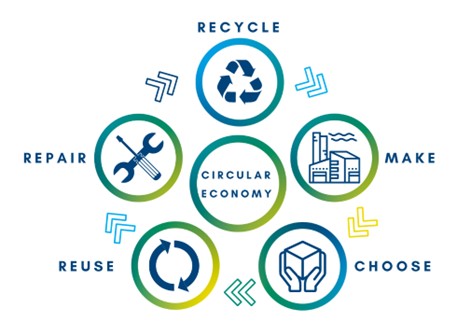Scotland needs a strong and ambitious Circular Economy Bill
Michael Cook, chief exec of Circular Communities Scotland, has written this blog on the need for a big impact from Scotland's Circular Economy Bill.
To combat climate change, Scotland has set the target of being net zero by 2045. We will not achieve this by accident, but only through a strong concerted effort from all sections of society.
To achieve net zero the voluntary sector needs to play its part and that includes you!
When you think about combatting climate change, I wonder what image comes to mind – buying an electric car (transport) or switching to renewables (energy) perhaps – but what about shopping (consumption)? Zero Waste Scotland estimates that 82% of our carbon footprint comes from the products and services we consume, and we need to reduce this urgently.

This requires us to shift from a linear economy where we take virgin materials, manufacture new products, and discard them when they are no longer useful to us, to a circular economy. A circular economy keeps resources and products in use for as long as possible through reuse, repair, and recycling.

Circular Communities Scotland’s rapidly growing membership are at the coal face of delivering this reuse, repair, and recycling activity across Scottish communities. From Arran to Aberdeen, Dingwall to Dundee, voluntary organisations are leading this circular transition, but we need greater support and investment to accelerate this change.
The good news is that Scotland faces a once in a generation opportunity to accelerate our transition to a circular economy. Scottish Government is currently consulting on a Circular Economy Bill and accompanying Route Map. At Circular Communities Scotland we are calling for a strong and ambitious bill. We have set out 10 key policy asks which we believe are needed to deliver this:
- National reuse targets to ensure local authorities prioritise reuse over recycling.
- A statutory agency for the circular economy – a strong public body with responsibility to deliver faster and more ambitious transition to a circular economy.
- Statutory requirements for reuse facilities to ensure consistent reuse provision across Scotland.
- Investing in local authority recycling centres to deliver adequate and effective set aside for reuse provision.
- Investment in reuse and repair projects to grow reuse and repair provision in Scotland.
- Embrace right to repair to increase the lifespan of products.
- Extended producer responsibility to engage thoughtfully with re-use activities and practises.
- Ban unnecessary product destruction to stop waste and provide quality products for reuse organisations.
- Circular public procurement to embed circular practises into public sector tendering and procurement.
- Phase our single use products to avoid unnecessary waste.
More information on these policy positions can be found in our Policy Paper for Scotland’s Circular Economy, which we are asking Circular Communities Scotland members and supporter members to sign, and we are also running a series of events to support our members and others to respond to this consultation.
None of these policies are themselves a magic bullet. For example, setting reuse targets will not increase reuse without accompanying action and investment. However, we believe that the coordinated delivery of all these policies will be a game changer. Scotland urgently needs to prioritise reuse and repair over just recycling. Strong and ambitious action now has the potential to deliver this in time to ensure we meet our 2045 aspirations.



